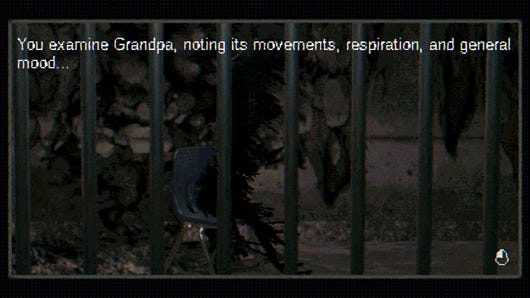-

Grow your very own grandpa in this wonderfully unpleasant little indie horror game
Growing My Grandpa! offers just that opportunity
-

This delightful fantasy immersive sim somehow snuck its merry way into Steam’s FPS fest
I have found the spoon of legend
-

I spoke to an Nvidia AI NPC, and he mainly wanted to get me bladdered
In conversation with the cocktail-obsessed gamepeople of our supposed future
-

1000xResist is a time travel story inspired by Star Trek, the pandemic and immigrant trauma
And also, a work of experimental theatre
-

Homeworld 3 DLC plans revealed alongside collector’s edition with model spaceships
Expect a mix of free and paid updates aimed at its ‘War Games’ multiplayer mode
-

Alice0 is leaving RPS, come and celebrate her work and make lamentation
Stop all the clocks
-

Shadow-hopping platformer Schim emerges into the light in July
A bit like Hitman but a platformer and with no murder?
-
No Rest For The Wicked will be playable on Steam Deck, although recommended PC specs may be a worry
Should be good couch fodder
-
What's better: a 'put back' action, or standing atop another player's head in an FPS?
Vote now as we continue deciding the single best thing in games
-
The Maw - 15th-20th April 2024
This week's least boring videogame releases, plus our weekly liveblog
Live
Psst! Explore our new "For you" section and get personalised recommendations about what to read.
-

£25 for a pair of speakers sounds great to us
These Creative Pebble V3 speakers are a great choice for rich, clear audio on a budget.
-

Get the fastest PCIe 4.0 SSD for $139 at Amazon
Save over $50 on the Crucial T500.
-

You can get a WD Black SN850X 2TB SSD for as little as £112 but they're selling fast
Save up to £28 on this speedy SSD using the eBay app and a special discount code.
-

The Crucial P3 2TB, one of the fastest 3.0 SSDs, is on sale for just £85
Get a big chunk of storage space for a bargain price.
-

Stardew Valley gets yet another update, adding new mine layouts and ominous-sounding "fish frenzies"
Plus fixes and changes for modders
-

This delightful fantasy immersive sim somehow snuck its merry way into Steam’s FPS fest
I have found the spoon of legend
-

Alice0 is leaving RPS, come and celebrate her work and make lamentation
Stop all the clocks
-

What's it like adding a world to Star Wars? The Outlaws developers explain
Some insights from Massive's Julian Gerighty on negotiating with Lucasfilm
-

Fallout 76 has a hellish new area and Bethesda want you to nuke it
Welcome to Skyline Valley, live now on the public test server
-

Cities: Skylines 2 devs apologise for "rushed" DLC, offer refunds, promise conciliatory fan summit
Beach Properties pack's sandcastle gets kicked in for good
-
No Rest For The Wicked devs working on fixes for performance issues and progression loss bugs
No rest for Moon Studios either
-
Boys will once again be boys in Kingdom Come: Deliverance 2, revealed today for 2024 release
Warhorse's next open worlder will be twice original's size, and yes, there are dick jokes
-
Wave goodbye to every free moment you have
-
Ghost of Tsushima: Director’s Cut brings PlayStation trophies and friends to PC for the first time
Cross-play multiplayer support’s here, but not platform-level chat (yet, anyway)
-

Supporters only: What are ‘solvable’ games, and is being solvable a bad thing?
Balatroptimisation
While trying to keep vaguely up on both games discourse and terminology over long periods of time, I frequently find myself noticing terms enter common usage, get used a bunch, then fall out of favour again. I think this is partly because games discourse is cyclical, and partly because writing and talking about the same things a lot means that when a neater phrase for …
-

Supporters only: An action platformer about getting an eye back from ants affirms my belief that games need a Ronseal approach to their titles
Ants Took My Eyeball is about a man who has had his eyeball taken. By ants.
-
Supporters only: Carpathian Night Starring Bela Lugosi takes Castlevania back to basics
And they call it Bela Notmuche
-
Supporters only: Fantasy games have a weird relationship with regional British accents
Whose epaulet is that pauldron?
Get your first month for £1 (normally £3.99) when you buy a Standard Rock Paper Shotgun subscription. Enjoy ad-free browsing, our monthly letter from the editor, and discounts on RPS merch. Your support helps us create more great writing about PC games.
See more information-

Review: Goblin Stone review: turn-based charm spells only last so long
Goblin’ up my patience more like
-

Review: Bore Blasters review: achieve catharsis as a dwarf yelling and shooting mud
Explodey hole
-

Review: Broken Roads review: this Fallout-style RPG is Vegemite and (some) magic
Dollarydoo or dollarydon’t?
-

Review: Children Of The Sun review: an intense and stylish puzzle of ultraviolence
The only option is shoot to kill
-

A very puzzling collection
-

The 15 best open world games on PC
Keep your options open
-

Review: Botany Manor review: peaceful and beautiful best-in-show plant puzzles
Come away, O human child! To the waters and the wild
-

From older classics to brand new trail-blazers
-

After six months of renovations, Cities: Skylines 2 performance is considerably less terrible
Some GPUs get more than double the frames since launch
-

Manor Lords performs fine on Steam Deck – it’s the controls you’ll want to watch out for
Contort your thumbs now, my lord
-

Manor Lords’ early access launch is built on solid technical ground, mostly
Mind your manors with this performance and settings guide
-

How to connect a Steam Deck to a TV
It's not quite plug and play
-

Grow your very own grandpa in this wonderfully unpleasant little indie horror game
Growing My Grandpa! offers just that opportunity
-

This delightful fantasy immersive sim somehow snuck its merry way into Steam’s FPS fest
I have found the spoon of legend
-

FACEMINER is the dystopian surveillance work-from-home side hustle you’ve always wanted
the world's first 'hardcore thriller clicker'-type game
-

Still Wakes The Deep’s authentic horror aims to channel Ken Loach by way of Stanley Kubrick
“In obscurity comes horror,” says lead designer Rob McLachlan
-

Supporters only: What are ‘solvable’ games, and is being solvable a bad thing?
Balatroptimisation
-

Grow your very own grandpa in this wonderfully unpleasant little indie horror game
Growing My Grandpa! offers just that opportunity
-

Stardew Valley gets yet another update, adding new mine layouts and ominous-sounding "fish frenzies"
Plus fixes and changes for modders
-

This delightful fantasy immersive sim somehow snuck its merry way into Steam’s FPS fest
I have found the spoon of legend
-

Alice0 is leaving RPS, come and celebrate her work and make lamentation
Stop all the clocks
-

What's it like adding a world to Star Wars? The Outlaws developers explain
Some insights from Massive's Julian Gerighty on negotiating with Lucasfilm
-
Fallout 76 has a hellish new area and Bethesda want you to nuke it
Welcome to Skyline Valley, live now on the public test server
-
Cities: Skylines 2 devs apologise for "rushed" DLC, offer refunds, promise conciliatory fan summit
Beach Properties pack's sandcastle gets kicked in for good
-
No Rest For The Wicked devs working on fixes for performance issues and progression loss bugs
No rest for Moon Studios either
-
Boys will once again be boys in Kingdom Come: Deliverance 2, revealed today for 2024 release
Warhorse's next open worlder will be twice original's size, and yes, there are dick jokes
-

No Rest For The Wicked: How to save your game
Here is how to save your game in No Rest For The Wicked
-

No Rest For The Wicked: How to repair equipment
Here's how to repair weapons and armour in No Rest For The Wicked
-

No Rest For The Wicked: Best stats
All the stats you should prioritise first in No Rest For The Wicked
-

Tiny Tina's Wonderlands SHiFT codes
Grab yourself some premium loot with these new SHiFT codes for Tiny Tina's Wonderlands!
-

Here's an archive of previous Wordle words
-

Today's NYT Connections hint and answers (Fri, Apr 19)
Need a hint for today's Connections? Read our guide for help with Connections #313
-
Wordle hint and answer today #1035 (April 19 2024)
Stuck on today's Wordle word for April 19? Read our hint or find the answer below!
-
All free games on the Epic Games Store: What's free right now?
Plus a list of all previous free games on the Epic Games Store
-
This week's GTA Online Podium Car
Find out which car is the podium prize this week
-
Honkai Star Rail codes (April 2024)
Gain Stellar Jade and more rewards with these Honkai: Star Rail codes before they expire!









4